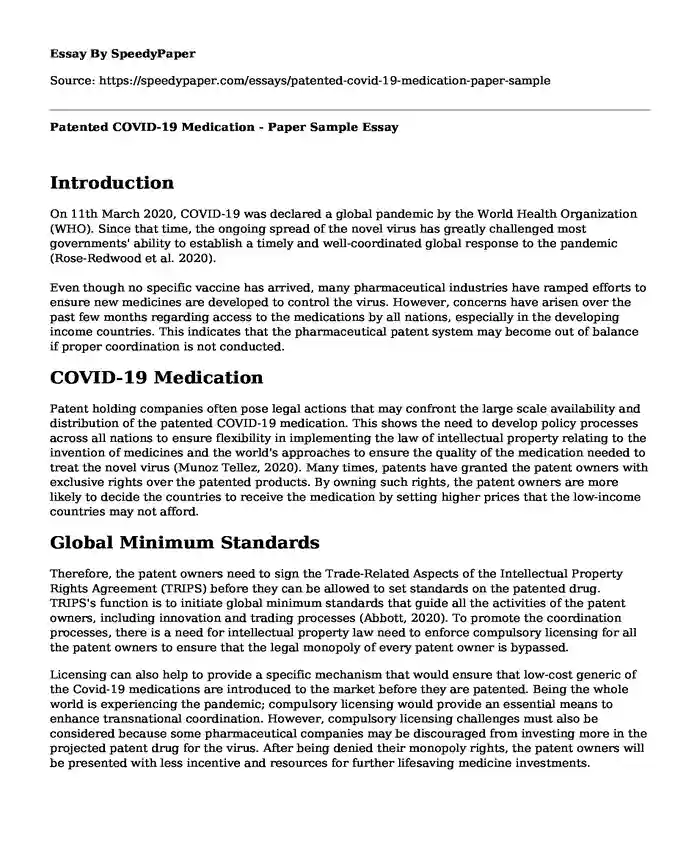Introduction
On 11th March 2020, COVID-19 was declared a global pandemic by the World Health Organization (WHO). Since that time, the ongoing spread of the novel virus has greatly challenged most governments' ability to establish a timely and well-coordinated global response to the pandemic (Rose-Redwood et al. 2020).
Even though no specific vaccine has arrived, many pharmaceutical industries have ramped efforts to ensure new medicines are developed to control the virus. However, concerns have arisen over the past few months regarding access to the medications by all nations, especially in the developing income countries. This indicates that the pharmaceutical patent system may become out of balance if proper coordination is not conducted.
COVID-19 Medication
Patent holding companies often pose legal actions that may confront the large scale availability and distribution of the patented COVID-19 medication. This shows the need to develop policy processes across all nations to ensure flexibility in implementing the law of intellectual property relating to the invention of medicines and the world's approaches to ensure the quality of the medication needed to treat the novel virus (Munoz Tellez, 2020). Many times, patents have granted the patent owners with exclusive rights over the patented products. By owning such rights, the patent owners are more likely to decide the countries to receive the medication by setting higher prices that the low-income countries may not afford.
Global Minimum Standards
Therefore, the patent owners need to sign the Trade-Related Aspects of the Intellectual Property Rights Agreement (TRIPS) before they can be allowed to set standards on the patented drug. TRIPS's function is to initiate global minimum standards that guide all the activities of the patent owners, including innovation and trading processes (Abbott, 2020). To promote the coordination processes, there is a need for intellectual property law need to enforce compulsory licensing for all the patent owners to ensure that the legal monopoly of every patent owner is bypassed.
Licensing can also help to provide a specific mechanism that would ensure that low-cost generic of the Covid-19 medications are introduced to the market before they are patented. Being the whole world is experiencing the pandemic; compulsory licensing would provide an essential means to enhance transnational coordination. However, compulsory licensing challenges must also be considered because some pharmaceutical companies may be discouraged from investing more in the projected patent drug for the virus. After being denied their monopoly rights, the patent owners will be presented with less incentive and resources for further lifesaving medicine investments.
Conclusion
Over the past few months, thirty countries, including the United States, Japan, and the European Union, opted not to import any drug manufactured and patented in other countries that issued compulsory licensing to all exports. Such a decision might negatively impact the patent products' access due to the resulting complexities from both the patent and the global supply chain. Thus the need to address such a decision would be critical because it is irrational for even the richer countries to single out themselves from the ongoing pharmaceutical processes to meet the Covid-19 needs (Velásquez, 2020). Thanks to the several advocacy groups and experts that have continuously spearheaded the transnational coordination. This would ensure that when the appropriate patented products have been acquired, its supply may not be limited to certain countries, while the rest cannot meet the COVID-19 demands for the population.
References
Rose-Redwood, R., Kitchin, R., Apostolopoulou, E., Rickards, L., Blackman, T., Crampton, J., & Buckley, M. (2020). Geographies of the COVID-19 pandemic. Dialogues in Human Geography, 10(2), 97-106. https://doi.org/10.1177/2043820620936050
Munoz Tellez, V. (2020). The COVID-19 Pandemic: R&D and Intellectual Property Management for Access to Diagnostics, Medicines, and Vaccines. Medicines and Vaccines (April 10, 2020).
Velásquez, G. (2020). Rethinking R&D for Pharmaceutical Products after the Novel Coronavirus COVID-19 Shock. Available at SSRN 3640355.
https://www.southcentre.int/research-paper100-december-2020/
De Beer, J., & Gold, E. R. (2020). International Trade, Intellectual Property, and Innovation Policy: Long-Term Lessons from the COVID-19 Crisis. Intellectual Property and Innovation Policy: Long-Term Lessons from the COVID-19 Crisis.
Huang, J. J. (2020). COVID-19 and Applicable Law to Transnational Personal Data: Trends and Dynamics. Sydney Law School Research Paper (20/23):
http://ssrn.com/abstract=3570178
Abbott, F. M. (2020). The TRIPs Agreement Article 73 Security Exceptions and the COVID-19 Pandemic. Research Paper, 116.
Cite this page
Patented COVID-19 Medication - Paper Sample. (2024, Jan 01). Retrieved from https://speedypaper.net/essays/patented-covid-19-medication-paper-sample
Request Removal
If you are the original author of this essay and no longer wish to have it published on the SpeedyPaper website, please click below to request its removal:
- Dornase/Pulmozyme Essay Example for Everyone
- Difference Between Quality Improvement Project and Research
- Paper Example on the Condition of HPV
- Paper Example: The Social and Economic Lived Experiences of Teen Mothers
- Essay Sample on Diet and Mental Disorder
- Essay on 21st Century Challenges: Improving Emergency Management & Global Health
- Free Essay Sample: Mental Health and Stigmatization
Popular categories





